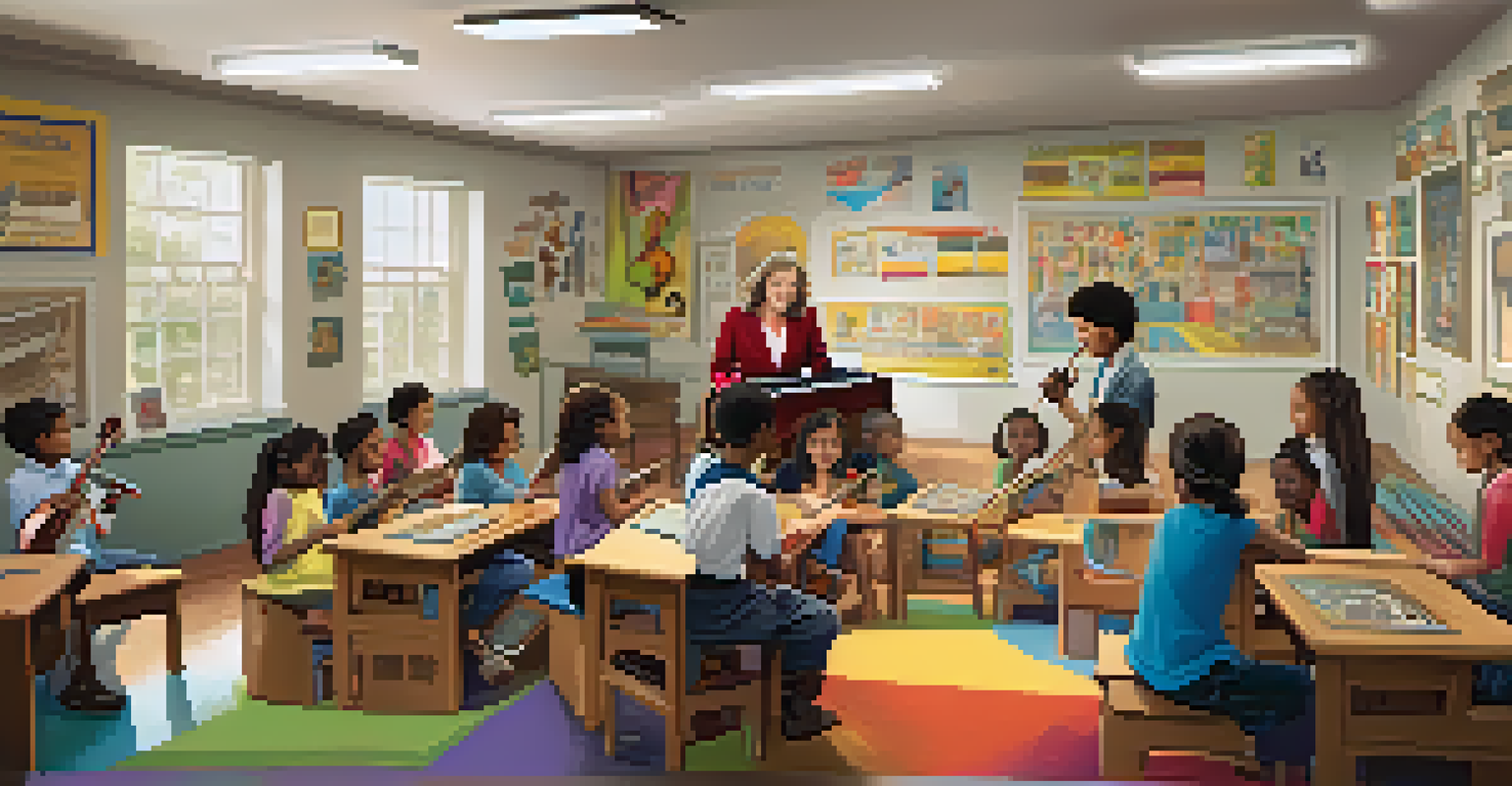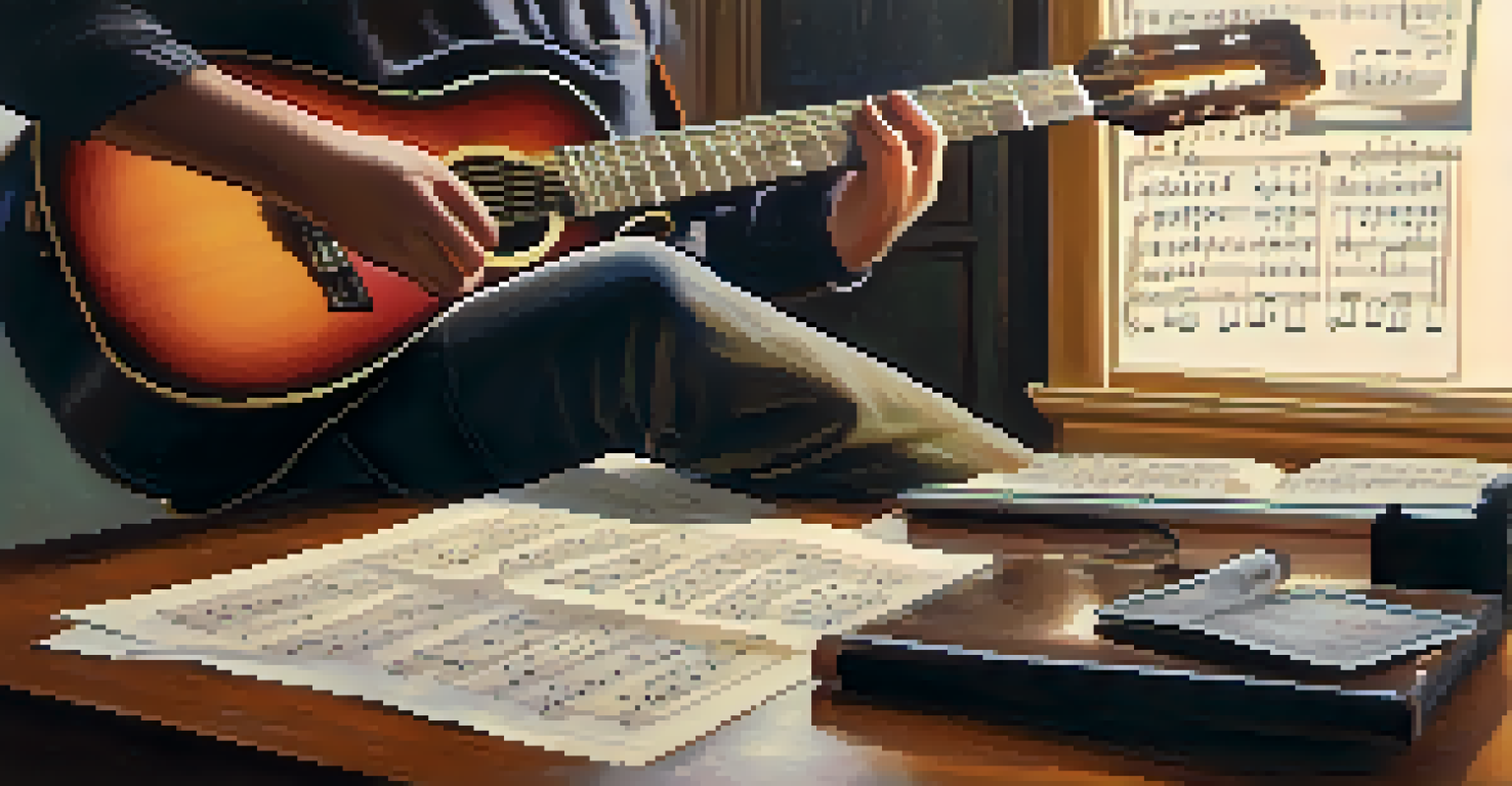The Role of Music Education in Austin's Vibrant Culture

Austin: A City with a Rich Musical Heritage
Austin is renowned for its vibrant music scene, often dubbed the 'Live Music Capital of the World.' This title isn't just a catchy phrase—it's rooted in the city’s deep musical heritage. From blues to country, the diverse genres reflect the cultural melting pot that Austin embodies. The sounds of legendary venues like the Continental Club and Antone's create an atmosphere where music isn't just heard; it's lived.
Music can change the world because it can change people.
Music education has played a critical role in this cultural tapestry, nurturing local talent and fostering appreciation for various musical forms. Schools, community programs, and local organizations work tirelessly to ensure that music remains an integral part of Austin's identity. As a result, students are not only learning instruments but also gaining insights into the rich histories and stories behind the music they create.
Through these educational initiatives, Austin cultivates not only musicians but also informed audiences who understand and support the arts. This symbiotic relationship between music education and the local culture reinforces Austin's status as a hub for creativity and expression.
The Impact of Music Programs in Schools
Music programs in schools across Austin are instrumental in shaping young minds and fostering creativity. These programs not only teach students how to play instruments but also instill teamwork and discipline. For instance, participating in a school band helps students learn the importance of collaboration while refining their individual skills.

Moreover, studies have shown that students involved in music education tend to perform better academically. This is because music engages different areas of the brain, enhancing cognitive abilities and critical thinking skills. Schools like McCallum High School, with its acclaimed Fine Arts Academy, serve as a perfect example of how a strong music curriculum can propel students toward success.
Austin's Music Education Impact
Music education in Austin shapes creativity and academic success, fostering a strong connection to the city's rich musical heritage.
Ultimately, music education in schools helps to build a sense of community among students while connecting them to Austin's rich musical heritage. As these young musicians grow, they carry forward the traditions and creativity that define the city’s vibrant cultural landscape.
Community Programs and Their Role
Community music programs in Austin are vital in providing access to music education for all ages and backgrounds. Organizations like the Austin Classical Guitar and the Austin Youth Orchestra offer scholarships and outreach programs, ensuring that financial barriers do not hinder a child's musical journey. This inclusivity enriches the local culture by allowing diverse voices to be heard.
Education is not the filling of a pail, but the lighting of a fire.
These programs often host events and concerts, bringing the community together to celebrate music in its many forms. For example, the Austin Music Foundation provides resources and support for emerging artists while connecting them with industry professionals. Such initiatives create a vibrant ecosystem where music thrives and evolves.
Through community involvement, residents not only support local artists but also foster a culture of appreciation for the arts. As people come together to learn, play, and enjoy music, they strengthen the bonds that make Austin a unique place to live and create.
The Influence of Local Musicians
Local musicians in Austin play a pivotal role in shaping the city's cultural identity, often serving as mentors to aspiring artists. Their influence extends beyond performances; many actively participate in teaching and community outreach. This hands-on involvement creates a nurturing environment where new talent can flourish.
For instance, renowned musicians often hold workshops or masterclasses to share their experiences and skills with the next generation. Such interactions provide invaluable learning opportunities, offering insights that go beyond traditional music education. When students learn directly from those who have succeeded in the industry, they gain practical knowledge that can inspire their own careers.
Community Programs Enhance Access
Community music programs in Austin provide inclusive opportunities for all, enriching the local culture and supporting diverse voices.
By fostering relationships between established artists and young musicians, Austin cultivates a rich, intergenerational dialogue about music. This exchange of ideas and experiences contributes to the city’s ever-evolving musical landscape, reinforcing the importance of community in the arts.
Festivals Celebrating Music Education
Austin is home to numerous music festivals that not only entertain but also emphasize the importance of music education. Events like South by Southwest (SXSW) and Austin City Limits (ACL) showcase local talent while providing platforms for educational discussions and workshops. These festivals create a dynamic space where music lovers can engage with artists and learn about the industry.
During these events, local schools and organizations often set up booths to promote their programs, encouraging festival-goers to get involved. This outreach is crucial in raising awareness about the benefits of music education and its impact on the community. Additionally, many festivals incorporate youth performances, giving young musicians a chance to shine on a larger stage.
By integrating education into the festival experience, Austin reinforces its commitment to nurturing the next generation of artists. This celebration of music not only highlights the city's talent but also inspires attendees to support music education initiatives.
The Role of Technology in Music Education
In recent years, technology has revolutionized the way music education is delivered in Austin. With the rise of online platforms, students have greater access to resources, tutorials, and even virtual lessons. This shift has made learning music more accessible, allowing individuals to explore their interests at their own pace.
Apps and software designed for music education enable students to practice and collaborate in innovative ways. For instance, programs like GarageBand and Noteflight allow aspiring musicians to compose, edit, and share their work, fostering a sense of creativity and independence. These tools can complement traditional teaching methods, providing a well-rounded educational experience.
Technology Transforms Learning
The integration of technology in music education offers innovative resources, making learning more accessible and connecting students globally.
Moreover, technology has opened doors for remote learning, connecting students with instructors from around the globe. This global perspective introduces new influences and techniques that can enrich Austin's already vibrant music scene. As technology continues to evolve, so too will the ways in which music education shapes the city’s cultural landscape.
Looking Ahead: The Future of Music Education in Austin
As Austin continues to grow, the future of music education in the city looks promising. Ongoing support from local government, businesses, and community members is essential in sustaining and expanding music programs. With a collective effort, there's potential to create even more opportunities for students to explore their musical passions.
Innovative approaches to music education, such as integrating arts into STEM fields (often referred to as STEAM), are gaining traction. This interdisciplinary approach not only enhances creativity but also prepares students for a variety of career paths. By emphasizing the importance of music in education, Austin can establish itself as a leader in fostering artistic talent.

In conclusion, the role of music education in Austin's vibrant culture cannot be overstated. It enriches lives, connects communities, and sustains the city’s unique musical heritage for generations to come.